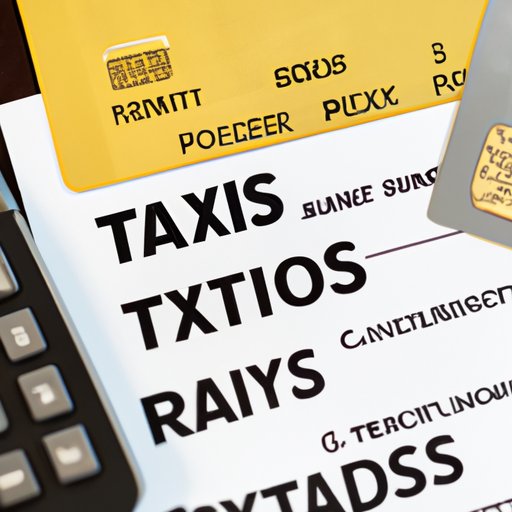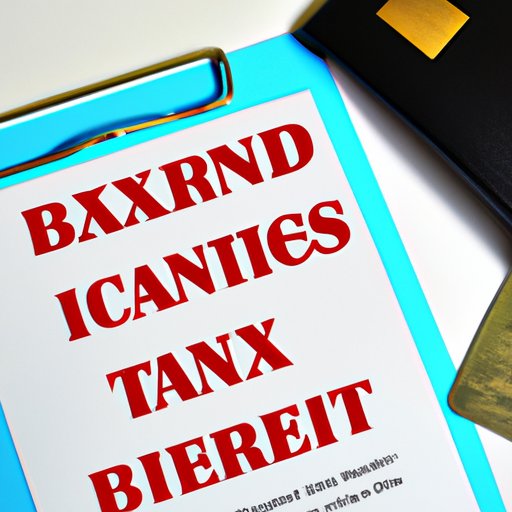
I. Introduction
As tax season approaches, many people wonder whether they can pay their IRS taxes with a credit card. While paying taxes using a credit card can be a convenient way to cover your tax debt, it is essential to understand the ins and outs of the process to make sure it is financially sound. This article aims to guide you through the process of paying your taxes with a credit card and help you determine whether it is the right decision for you.
II. Maximizing Rewards: Paying the IRS with Credit Card
Rewards credit cards, including cashback and travel rewards cards, can be incredibly beneficial when you pay your taxes with a credit card. Credit card companies often offer generous rewards for high-dollar purchases like tax payments. In most cases, rewards credit cards pay between 1% to 5% cashback on purchases, which can add up to a lot of money if you’re paying a significant tax bill.
There are many types of rewards cards, including airline cards, hotel cards, gas reward cards, and store cards. Depending on your needs, you may find that some reward cards offer better benefits when paying your IRS taxes. It is crucial to review the rewards rate, annual fees, interest rates, and other fees, such as foreign transaction fees, before choosing the best rewards card.
To maximize the rewards, it is best to pay your tax bill in full and on time using your rewards card. Otherwise, the fees and high-interest rates may negate the rewards earnings, and you may end up paying more in fees than you earn in rewards.
III. Pros and Cons of Paying the IRS with a Credit Card
Paying your IRS taxes with a credit card has several pros and cons that you should be aware of:
A. Advantages of paying IRS taxes with credit cards
- Convenient and provides immediate access to credit
- Enables you to earn credit card rewards
- May provide an alternative method of financing tax debt
- Can help improve your credit score if you pay the balance in full and on time
B. Drawbacks of paying IRS taxes with credit cards
- May incur additional fees, including convenience fees and interest rates
- May lower your credit score if you carry a balance or miss payments
- May not offer the most competitive interest rates compared to other financing options
IV. Why Paying the IRS with a Credit Card Can Be Worth It
Even though paying your IRS taxes with a credit card may incur fees and interest rates, there are situations where it could be worthwhile:
For instance, suppose you have a high-yield savings or investment account; you could use your credit card to pay off your tax bill and let your savings or investments continue to grow. Additionally, suppose you may not qualify for a low-interest loan or line of credit to finance your tax debt. In that case, you could use your credit card with a lower interest rate than traditional financing options.
However, before deciding to pay your tax debt using a credit card, it is crucial to compare the cost of fees and interest rates of other financing options and assess if paying the tax debt using a credit card would save you money.
V. Avoiding the Penalties: Paying Your Taxes with a Credit Card
When you owe the IRS taxes, it is crucial to pay them on time to avoid incurring penalties and interest charges. If you cannot pay the full amount, it is still possible to avoid some of the penalties by making an agreement with the IRS.
A. Explanation of the penalties for not paying IRS taxes on time
If you don’t pay your IRS taxes by the deadline, you will incur a late payment penalty, which is typically 0.5% of the taxes owed per month. The late payment penalty can max out at 25% of the unpaid tax bill. You will also incur interest on the unpaid tax amount, which is typically 3% plus the current federal short-term rate. Interest continues to accrue on the unpaid tax bill until you pay it off entirely.
B. Advice on how to avoid penalties
If you can’t pay the full amount, you can apply for an installment agreement, which will enable you to pay off the debt over time. The installment agreement fee is $31 for direct debit from a bank account and $149 for non-direct debit. However, both fees are lower for low-income taxpayers.
C. Discussion of how paying IRS taxes with a credit card can help avoid penalties
Paying your IRS taxes with a credit card can also help you avoid the late payment penalty mentioned earlier. The payment date is based on the date you charged your tax bill to your credit card, not the date you pay off the card. You may need to apply for a short-term installment agreement to get more time to pay off the credit card balance without incurring additional penalties.
VI. The Nitty Gritty: How to Pay Your IRS Taxes Using a Credit Card
You can pay your IRS taxes using a credit card through authorized payment processors such as Pay1040.com, PayUSAtax.com, and OfficialPayments.com. To use these processors, you need to provide your tax information, credit card information and follow the payment instructions. Each payment processor charges different convenience fees, which range from 1.87% to 1.99% of the tax amount you owe. An additional $2.59 to $3.95 fee may apply.
VII. What You Need to Know Before Paying the IRS with a Credit Card
A. Explanation of the fees associated with paying taxes with a credit card
When you pay your IRS taxes with a credit card, you will incur a convenience fee charged by the payment processor. The convenience fee ranges from 1.87% to 1.99%. This fee is not tax-deductible and adds to the total amount you owe. In most cases, this convenience fee is less than the late payment penalties and interest, making paying your taxes with credit cards a viable option.
B. Discussion of interest rates and potential impact on credit score
When you use your credit card to pay your IRS taxes, you could incur a high-interest rate if you do not pay off the balance in full at the end of the billing cycle. A high balance may affect your credit score, as high credit utilization is one of the factors considered in calculating your credit score. While paying your tax with a credit card can improve your credit score, it is essential to make timely payments and keep your credit utilization low to minimize the risk of damaging your credit score.
C. Advice on how to avoid unnecessary fees
To avoid unnecessary fees when paying your tax debt with a credit card, it is crucial to know all the fees involved. Paying in full and on time and choosing a lower fee payment platform can help reduce your fees.

VIII. The Benefits of Paying Your Taxes with a Credit Card and How to Do It Safely
There are several benefits of paying your tax debt with a credit card, provided that you have the funds to pay off the card by the end of the billing cycle. Not only can you earn rewards, but you can potentially avoid late payment penalties and interest charges. However, it is crucial to ensure that the payment processor is legitimate and that the process is done safely and securely.
When paying your IRS taxes with a credit card, it is essential to use authorized payment processors and avoid sending your personal information through email. Beware of phishing scams and thoroughly research the payment processor before making a payment.
IX. Conclusion
Paying your IRS taxes with a credit card can be a convenient and potentially beneficial option for those who plan accordingly. It can help you earn rewards, avoid late payment penalties, and provide an alternative method for financing your tax debt. However, it is essential to carefully research the fees and interest rates involved and make timely payments to ensure it is cost-efficient. By following this guide, you can ensure that paying your taxes with a credit card is done safely, securely, and to your benefit.





